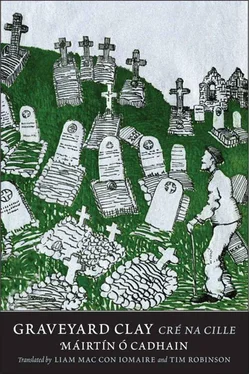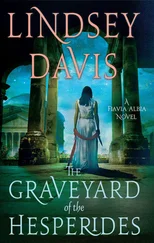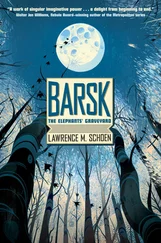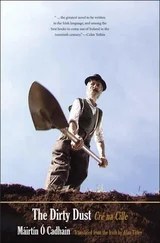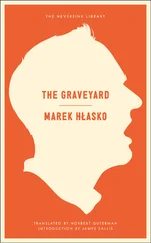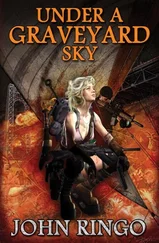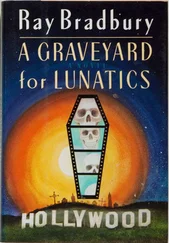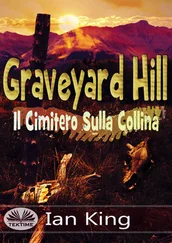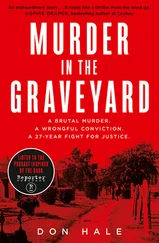— Never mind your Frenchwoman! My son is married in England to an Eyetalian .
What do you think of that?
— Yourself and your Eyetalian . My son is married in England to a black! What do you think of that, now?
— A black! My son is married in England to a Jewess. It’s not every man a Jewess would be willing to marry …
— It’s not every man would marry her. A fellow would have an aversion to her …
— A fellow would have much more of an aversion to the woman who’s married to your son. A black . Ugh!
— The big boss is to be married to a woman from Glen of the Pasture. That young fellow of Seáinín Liam’s has finished the stable, and they say he’s on the lookout for a wife. He was refused when he asked for Road-End’s daughter.
— Road-End, who spent every day of his life stealing my turf …
— And mine …
— And my lump-hammer …
— Oh, the devil pierce her! Trying to get in on my big holding …
— She’s the one who threatened to have the law on me over my drift-weed. Seáinín Liam’s son wouldn’t marry that one, would he?
— She’s good enough for him. What the devil did Seáinín Liam ever have? Periwinkles. What the devil does he have now? Periwinkles …
— Faith then, periwinkles were not to be sneezed at, so they weren’t. Myself and the young fellow earned the best part of the price of a colt on them. We have more than what you people say we have: we have a fine big colt and a stable that only needs a roof. I told him when he’d have finished the stable to look out for a little rump of a girl for himself …
— The young fellow was refused in the house on the hill too, and for the Red’s daughter in Donagh’s Village, and for the Little Carpenter’s daughter in Mangy Field …
— There’s no go in that young fellow. Did he say that we’d earned the best part of the price of a colt on the periwinkles; that we’d just finished building a new stable, and that we bought a fine big colt after Christmas? He’ll never settle down, I’m afraid. Only for I died so suddenly myself …
— Listen, Seáinín Liam, the Red of Donagh’s Village is my first cousin. He was damn right to refuse your son. I refused you yourself for my daughter. Do you remember the time you came asking for her?
— I didn’t have a colt or a stable that time.
— You sound so full of self-importance the way you talk about the Red of Donagh’s Village, by the way. You’d think he was the Earl himself, and didn’t my father refuse him about a wife! “Do you think, Red,” said my father, “that I’d send my daughter to Donagh’s Village to live on nettles and the chirping of grasshoppers?”
— Your father refused the Red! My mother refused your father about a wife! “There’s two score pounds and a cow coming with my daughter,” says she, “and by my soul it’s not on the flea-infested hillocks of your village I’m going to settle herself or her two score pounds.”
— Your mother refused him about a wife! Your mother! Her father tried to pawn her off on me, but I wouldn’t marry her. She was purblind. She had a mole under her ear. Fifteen pounds was all the dowry she had. I wouldn’t marry her …
— I wouldn’t marry Big Brian. He asked for me …
— Arrah, I wouldn’t marry Big Brian either. He asked for me twice.
— Nor would I. He asked for me three times. By the oak of this coffin, he did. He damn near failed to get any wife at all. Caitríona Pháidín would have gladly married him, the time Jack the Scológ left her there, but he didn’t come asking for her …
— Ababúna! Cite of the lies! The ash-potatoes hag …
— … Honest , Dotie. The place wasn’t good enough at all. There’d be no fear of me settling my daughter there, and six score pounds of a dowry with her, only for it would have grieved me too much to keep her from him. There was always that streak of romance in me, and I wouldn’t have the heart to let paltry worldly considerations become an insuperable obstacle to their pitiable love. Honest . Only for that, Dotie, do you think I’d let my daughter, or my six score pounds, in on Caitríona Pháidín’s few measly pockets of land? …
— You mangy bitch! You So-an’-so! Don’t believe her! Don’t believe her! Muraed! Muraed! … Do you hear what Nóra Filthy-Feet is saying? And Cite of the lies? … I’ll explode!
5
— … Do you think it’s the War of the Two Foreigners?
— … A bad bottle the murderer gave me …
— … I had two score pints and two in my belly, and not a drop less, when I was tying Tomáisín …
— … It’s well I remember it. I twisted my ankle …
—“Zee dog is sinking.” Qu’est-ce que c’est que “zee dog” … Qu’est-ce que c’est que “zee-dog”? Zee dog. Zee dog.
— Bow wow! Bow wow!
— Un chien, n’est-ce pas? Zee dog. Bow wow! Zee dog.
— The dog. The dog. The dog, you numskull!
—“Zee dog is sinking.” Le chien pense, n’est-ce pas? “Zee dog is sinking.” Mais non! “Zee dog is sinking.”
— How would a dog be sinking, you numskull? Maybe he was thinking, or drinking, or even stinking. But it wasn’t sinking. Sinking! The devil a dog I ever saw sinking.
— Zee dog is sinking.
— The dog is thinking. The dog is thinking.
—“Zee dog is sinking.” “Sinking: t … h … i … n … k … i … n … g”! “Sinking.” Ce sont les mots qui se trouvent dans mon livre . “Zee dog is sinking.”
— If it’s sinking let it sink. The devil a thing we can do about it, or about whoever put it in the book either. Maybe it went drinking, and then it started sinking on account of the hangover and the empty pockets …
— Je ne comprends pas. Après quelques leçons peut-être … “Zee white cat is on zee stool.” “ Cat”: qu’est-ce qu’il veut dire? “Cat”? “Cat”?
— Me-ow! Me-ow!
— Miaou! Miaou! Chat! N’est-ce pas? Chat .
— Yes, what else?
—“Zee mat is small. Zee ’at is tall. Zee ’at is tall. Pól ’as a tall ’at …”
— You’re a liar! I never had a tall hat. You could hardly say I even had a low one! Do you think I’m a bishop or something?
— Je ne comprends pas . “Pól is old …”
— You’re a liar. I was young enough. I would only have been twenty-eight this next Feast of Saints Peter and Paul.
— Je ne comprends pas . “Pól is not drinking.”
— He’s not drinking now, because he doesn’t get the chance, but he drank all he had before this, and that wasn’t much.
— Je ne comprends pas .
— Au revoir! Au revoir! De grâce! De grâce! …
— The devil a word of Irish he’ll ever learn.
— He wouldn’t be long picking it up, all the same. We had an Irish learner staying with us the year I died. The devil a word in the whole wide world he had, but learning out of those little books like your man there. He’d be in the kitchen every morning an hour before I got up and he’d have the whole house topsy-turvy: “This is a cat. This is a sack. The cat is on the sack. This is a dog. This is a stool. The dog is on the stool.” That was his rigmarole all day long. He had my mother demented. “For God’s sake, Pól, take that fellow with you over to the field,” she said to myself. I was mowing a meadow by the boreen down to the shore at the time. I took him off with me. We were barely there when it was time to come back for our dinner, because he read the lesson to everyone we met on the way.
Back we went after dinner. I began giving him little words like “scythe,” “grass,” “wall,” “cock,” little words like that. The day was very sultry, and he was having great difficulty getting his tongue round the words. He spat out a few thick spits. He asked me how I’d say “pint” in Irish. “Pionta,” says I.
Читать дальше
